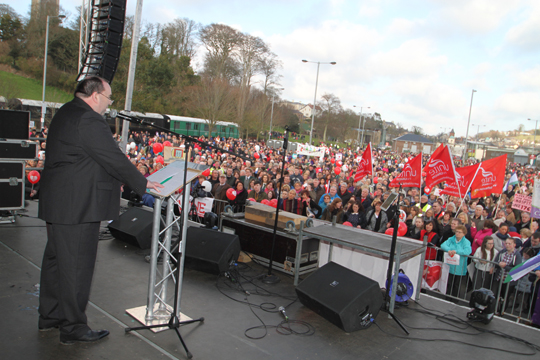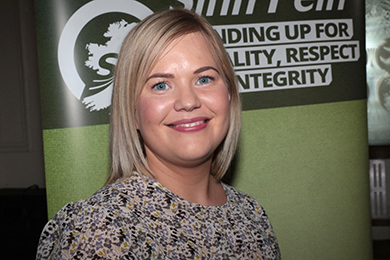Reshaping stroke services could reduce disability and save lives.
The Stroke Association has welcomed the launch of the Department of Health’s consultation on reshaping stroke services.
Currently there is no stroke service at the Downe Hospital in Downpatrick and patients are ambulanced to the Belfast hospitals approximately 30 miles away, and even further if travelling from Newcastle. And if a new Hyper Acute Stroke Unit (HASU) is created in Belfast, patients from as far as Newry could be forced to travel to this centre for emergency stroke treatment.

Eamonn McGrady, Chairman of the Down Community Health Committee, said: “This is a very important consultation and I would encourage everyone to respond to it. It will have major implications for stroke patients in County Down. Presently we do not have local stroke centres to treat patients with stroke and even the Ulster Hospital is unlikely to achieve the status of a HASU.
“The initial policy research on the HASU method of treating stroke was based on the model of treatment in England. A study was done on the London hospitals. However, we are faced in County Down in most areas by the lack of ambulances and trained staff and also by poor road infrastructure making it difficult to get to the HASU quickly and safely.
“I understand that there will be Air Ambulance support for patients with stroke but it will be hard to se e how this will completely meet the needs of the sufferers of stroke acounty Down. The Downe Hospital has an excellent body of trained staff and it would be good to see the Downe Hospital used in this re-organisation as a step-down hospital for patient rehabilitation.”

South Down MLA Emma Rogan (Sinn Féin) also commented on the consultation and said: “Plans to reshape stroke services here must ensure that standards of treatment are improved across the North and that proposals consolidate hospital stroke care into what have been described as regional centres of excellence.
Encouraging people to engage with the consultation she added: “Whatever new configuration emerges from the consultation, the result has to be an improved service for all patients across all areas.
“Every year, almost 1,000 people here die from stroke and independent health reports have called for an improvement in the standards of care.
“Reconfiguring services is one way to do that but it must be carried out in a regionally balanced way, in partnership with those who use and deliver services, with the objective of improved health outcomes for patients at its heart.
“The Department of Health have now launched a consultation process on their proposals and I would encourage people to engage with that process to make their views known.”
Brenda Maguire from the Stroke Association charity said: “Stroke is a devastating condition which can change lives in an instant. Stroke can happen to anyone, at any age and at any time. It’s the third biggest killer in Northern Ireland and the leading cause of adult disability.
“We are delighted that the Department of Health is moving forward and exploring options to modernise and improve stroke services. Reform is urgently needed and will save lives, reduce disabilities and help everyone affected by stroke to access the on-going support they need to rebuild their lives.
“There is clear evidence that reshaping stroke services works – creating larger Hyper Acute Stroke Units (HASUs) with the equipment and experts to treat stroke patients, all day, every day as well as creating more sustainable services. We believe everyone affected by stroke should get the best treatment and care possible. Reorganising stroke services will help achieve that.
“We will be carefully reviewing the proposals and working with people affected by stroke, carers and experts in the coming weeks to develop our response. We firmly believe this is an exciting opportunity to create a world class stroke service for Northern Ireland. We would encourage everyone to take the opportunity to have their say during this important process”.
The Department of Health launched the consultation on Tuesday 26th March 2019. Information on the consultation can be found here https://www.health-ni.gov.uk/consultations/reshaping-stroke-care
You can find more information on stroke and the Stroke Association’s position on reconfiguration of stroke services here N
***
A stroke is a brain attack which happens when the blood supply to the brain is cut off, caused by a clot or bleeding in the brain.
When stroke strikes, part of your brain shuts down. And so does a part of you. That’s because a stroke happens in the brain, the control centre for who we are and what we can do. It happens every five minutes in the UK and changes lives instantly. Recovery is tough, but with the right specialist support and a ton of courage and determination, the brain can adapt. Our specialist support, research and campaigning are only possible with the courage and determination of the stroke community.
There are around 4000 strokes in Northern Ireland every year and it is a leading cause of disability. There are over 1.2 million people in the UK living with the effects of stroke.
***
Stroke Association is a charity. We believe in rebuilding lives after stroke. We work directly with stroke survivors and their families and carers, with health and social care professionals and with scientists and researchers. We campaign to improve stroke care and support people to make the best recovery they can. We fund research to develop new treatments and ways of preventing stroke. The Stroke Helpline (0303 303 3100) provides information and support on stroke. More information can be found at www.stroke.org.uk























